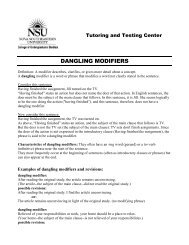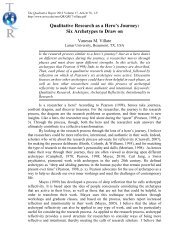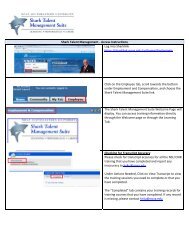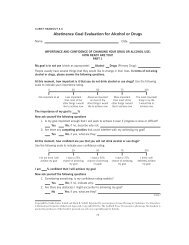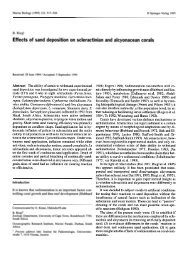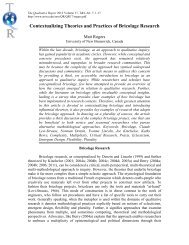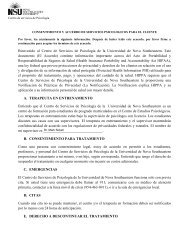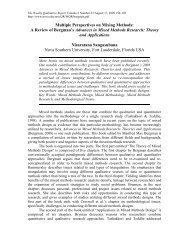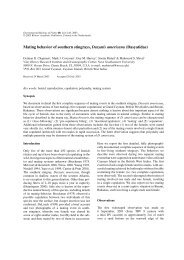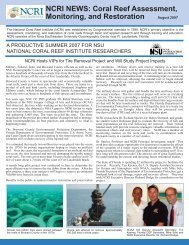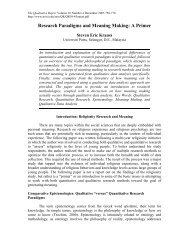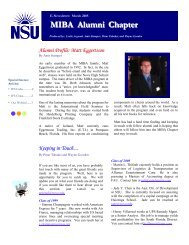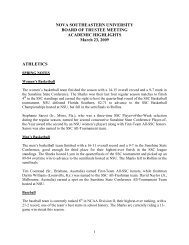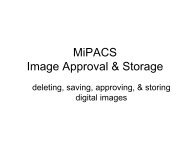11th ICRS Abstract book - Nova Southeastern University
11th ICRS Abstract book - Nova Southeastern University
11th ICRS Abstract book - Nova Southeastern University
You also want an ePaper? Increase the reach of your titles
YUMPU automatically turns print PDFs into web optimized ePapers that Google loves.
23.959<br />
Marine Protected Area Report Guide And Rating System: Do Scores Equate To The<br />
Reality Of Their Biophysical Status?<br />
Darwin John RAYMUNDO* 1<br />
1 Research, Coastal Conservation and Education Foundation, Inc., Cebu City, Philippines<br />
The Marine Protected Area Report Guide and Rating System being implemented by the<br />
Coastal Conservation and Education Foundation (CCEF) and its partners in the<br />
Philippines has been utilized to assess the effectiveness of management based on several<br />
indicators of enforcement and implementation. A very useful tool for determining the<br />
management framework of an MPA, one of its points that need improvement is on how<br />
ratings can truly reflect improving or declining biophysical status of MPAs from a<br />
management standpoint.<br />
This paper looks at the relationship between specific management criteria as rated in the<br />
MPA rating system and how this translates to the true biophysical status of MPAs.<br />
Although MPA rating per se does not show a significant correlation to live hard coral<br />
cover and fish densities, analysis of certain specific management criteria show varying<br />
correlations to these two parameters. Several recommendations are also given to further<br />
fine-tune the criteria of the rating system and improve its effectiveness.<br />
23.960<br />
Information For The Management Of Coral Reef Based Tourism At Mu Koh<br />
Chang, Thailand<br />
Niapt SOMKLEEB* 1<br />
1 Department of Biology, Ramkhamhaeng <strong>University</strong>, Bangkok, Thailand<br />
Mu Koh Chang, a new tourism destination of Thailand, is located in the eastern part of<br />
the Gulf of Thailand. There are consisted of 52 Islands in the area which harbor<br />
approximately 16 km 2 of coral reefs. Three main agencies related to coral reef<br />
management in this area are as follwing: 1) Mu Koh Chang National Park, an estimated<br />
30% of the coral reefs in this area are under responsibility of the national park. 2)<br />
DASTA (Designated Area for Sustainable Tourism Administration) Area 1, Thai<br />
Government uses this agency as a tool for sustainable tourism development in 2002. and<br />
3) Trat Province Office, this office supported the management of coral reef in this area.<br />
In 2005, Mu Koh Chang was selected as one of the demonstration sites for the coral reef<br />
subcomponent under the UNEP/GEF/SCS Project. The significant activities would<br />
provide information concerning sustainable tourism are i) Study carrying capacity for<br />
tourists. ii) Study to determine tourist fee for coral reef management purposes iii) Socioeconomic<br />
study in local communities iv) Monitoring coral reef conditions in both<br />
ecological and socio-economic aspects v) Mapping additional coral reef areas. The<br />
project would integrate all information and developed a network for management of coral<br />
reef in this area to facilitate all users for easily access the data. Establishment of<br />
coordination mechanism for coral reef based tourism and development of management<br />
plan and guideline for sustainable use of coral reef resources are also needed. This<br />
management plan and guideline for sustainable tourism based on coastal resources should<br />
be developed in the framework of coral reef demonstration site project with taking<br />
account functions of related stakeholders and linage in the network.<br />
Poster Mini-Symposium 23: Reef Management<br />
23.961<br />
The Effect Of The Interpretation Learning Process On Snorkeler Behavior in Coral<br />
Reefs, Thailand<br />
Petchrung SUKPONG* 1 , Suvaluck SATUMANATPAN 2<br />
1 Thailand Programme, IUCN - The World Conservation Union, Bangkok, Thailand, 2 Faculty of<br />
Environment and Resources Studies, Mahidol <strong>University</strong>, Nakornprathom, Thailand<br />
The Interpretation Learning Process is a study/project developed to help significantly reduce the<br />
damage caused by mass tourism on tropical coral reefs in Thailand and possibly, on a global<br />
basis. The Interpretation Learning Process is multimedia package included a brochure, a video<br />
cd and a guide-<strong>book</strong> designed to educate snorkelers/tour operators effectively on how they can<br />
minimize and prevent damage caused by their actions on coral reefs. The Interpretation<br />
Learning Process promotes the best practices for snorkeling coral reefs and educate them on<br />
their responsibilities for their action on nature.<br />
A study was conducted on Similan National Park, Thailand to observe the behavior of 160<br />
snorkelers divided into 2 separate groups – the experimental group which had undergone the<br />
Interpretation Learning Process and the control group which had not. The results of this month<br />
long study revealed a significant difference at the 0.05 alpha level between the groups. The<br />
experimental group exhibited considerable preventive behavior when swimming near coral<br />
reefs compared to the control group.<br />
The control group was found to touch the coral reef at an average frequency of 3.31 times in 30<br />
minutes, higher than the experimental group who were found to touch the coral reef at an<br />
average frequency of 2.56 times in 30 minutes. Factors affecting snorkeling behavior were the<br />
use of a life jacket, the Interpretation Learning Process, and the depth of the sea at which<br />
snorkeling occurred. The overall factors could be explained as having a correlation to<br />
snorkeling behavior at 32 per cent, meaning that divers who used life saving equipment,<br />
experienced the interpretation learning process, and snorkeled at a not too shallow sea level<br />
would have less damaging snorkeling behavior.<br />
23.962<br />
Management Of Artificial Reefs For Tourism in Phuket, Thailand<br />
Thamasak YEEMIN* 1 , Se SONGPLOY 1 , Sittiporn PENGSAKUN 1 , Nipat SOMKLEEB 1<br />
1 Department of Biology, Faculty Of Science, Ramkhamhaeng <strong>University</strong>, Bangkok, Thailand<br />
Tourism activities on natural coral reefs are important causes for coral reef degradation,<br />
especially new scuba divers and dive students who are easily to damage corals. The special<br />
designed artificial reefs for diving in Phuket, Thailand was initiated after the Indian Ocean<br />
Tsunami incident on December 26, 2004. It had affected coral reefs along the Andaman coast<br />
while the damages varied according to the morphology of each coastal area. Therefore, the<br />
diving spots in Thailand have been reduced and deteriorated. Department of Marine and Coastal<br />
Resources and Ramkhamhaeng <strong>University</strong> have jointly conducted a study and designed the<br />
artificial reefs to increase diving spots, to reduce coral damages, to lower density of diving<br />
activities along natural coral reefs, to enhance number of visiting divers and to encourage<br />
growth and diversity of natural resources and marine organisms. Racha Yai Island was selected<br />
for establishing the special designed artificial reef in Phuket Province because it’s natural coral<br />
reefs were visited by many tourists. The artificial reefs were specially designed to show Thai<br />
identity such as elephants, Thai pavilion, Thai designed signboard, and Thai traditional art<br />
arches with a pair of Thai demon. In addition, Phuket had named as “Pearl of the Andaman”<br />
therefore the large pearl oyster was also built. Diving in artificial reef areas would be a<br />
conservation tool and encourage coral reef recovery. The project monitoring program showed<br />
that the artificial reefs for diving in Phuket were interested by many foreign divers.<br />
Macrobenthic oraganisms, cryptic fauna and reef fish were found abundantly. The<br />
socioeconomic surveys revealed that the tourism sector in Phuket and its vicinity has gained<br />
direct and indirect benefits from the project. Management and maintenance of the artificial reefs<br />
for tourism are urgently required for sustainable uses.<br />
514



